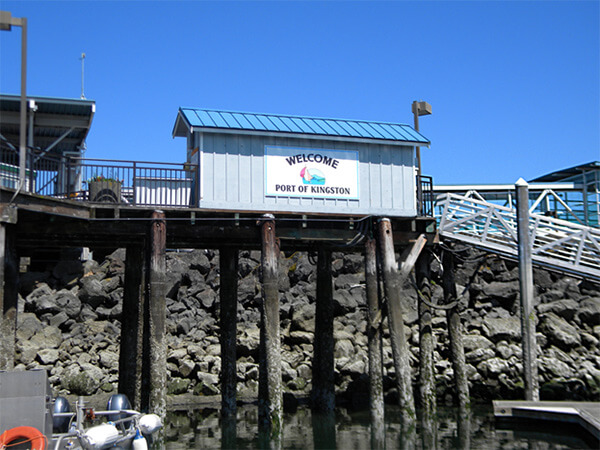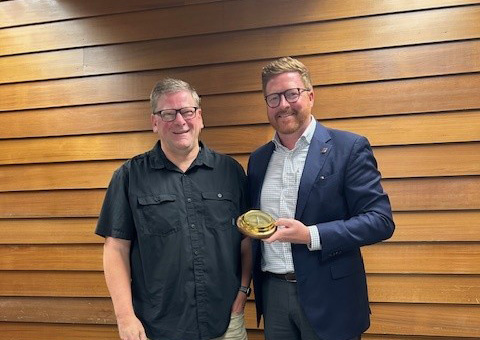By Tim Schermetzler of CSD Attorneys at Law P.S.
Chatbot Logs & Record Requests
With the emergence of generative AI tools like ChatGPT and their use becoming a mainstream tool for public employees, it should come as no surprise that this information has become a focus of public records requests. An emerging public records request in this space are requests for municipalities ChatGPT logs and similar records of prompts used in generative AI tools. Admittingly, I am approaching this topic with little expertise or experience using ChatGPT or any other generative AI chatbot. I have never used ChatGPT before writing this article. If you are like me, and haven’t used generative AI, there are at least three terms already in this article that are unfamiliar. Ironic as it may be, I used Google’s AI search tool and ChatGPT to help educate me on these AI terms for this article (see my conversation log in the pictures)…but I used good old-fashion human intelligence to write the rest.
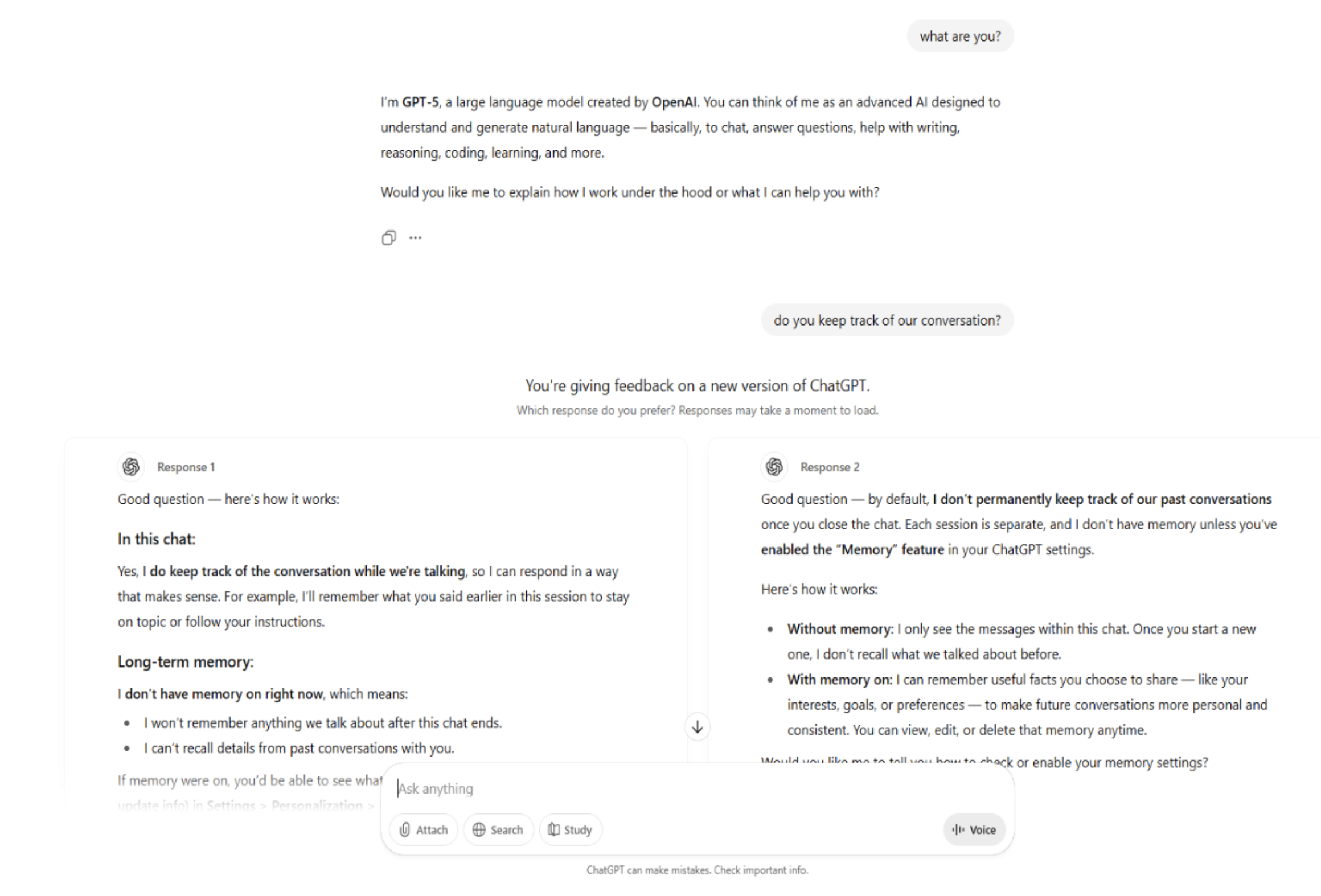
Generative AI is a type of artificial intelligence that
learns from large datasets to create content,
usually in the form of text or images, in response to
a prompt or input put in by the users. According to
Google AI, it works by encoding existing
information into a compressed form and then using
that compressed representation to generate new
data instances that share patterns and
characteristics with the original data. ChatGPT is
one type of “chatbot” developed by the company
OpenAI. Other technology companies have similar
AI tools or chatbots, such as Google Gemini,
Microsoft Copilot, and Amazon Q.
A ChatGPT log, more generally referred to as a
“conversation log,” is a record of the user’s
conversation with the AI tool, including prompts and
AI’s responses. Usually, these messages are kept
in order showing how the conversation
progressed. A key component of this tool is that
the chatbot generally saves these responses to
your account. The purpose of saving this data is
that it helps the AI tool “learn” overtime to further
customize future responses. For example, if a
port employee is using the chatbot to discuss
that port, the chatbot would refer to that
conversation history in generating future content,
essentially, it already “learned” that the
employee works for that port so it would not
have to collect that data a second time to use in
future responses. There may be options in a
chatbot’s settings to turn off the chat history so a
log is not created or retained.
This is where the Public Records Act, Chapter
42.56 RCW (“PRA”) and retention schedules
established under RCW 40.14 come into play.
The first question that must be addressed—is a
chatbot conversation is a public record? A
“public record” includes any writing containing
information relating to the conduct of government or the performance of any governmental or
proprietary function prepared, owned, used, or retained by any state or local agency regardless
of physical form or characteristics. 1 Writing is broadly defined to include, among other things,
“other documents including existing data compilations from which information may be obtained
or translated.” 2 Based on these broad definitions within the PRA, a chatbot log should be
treated as a public record.
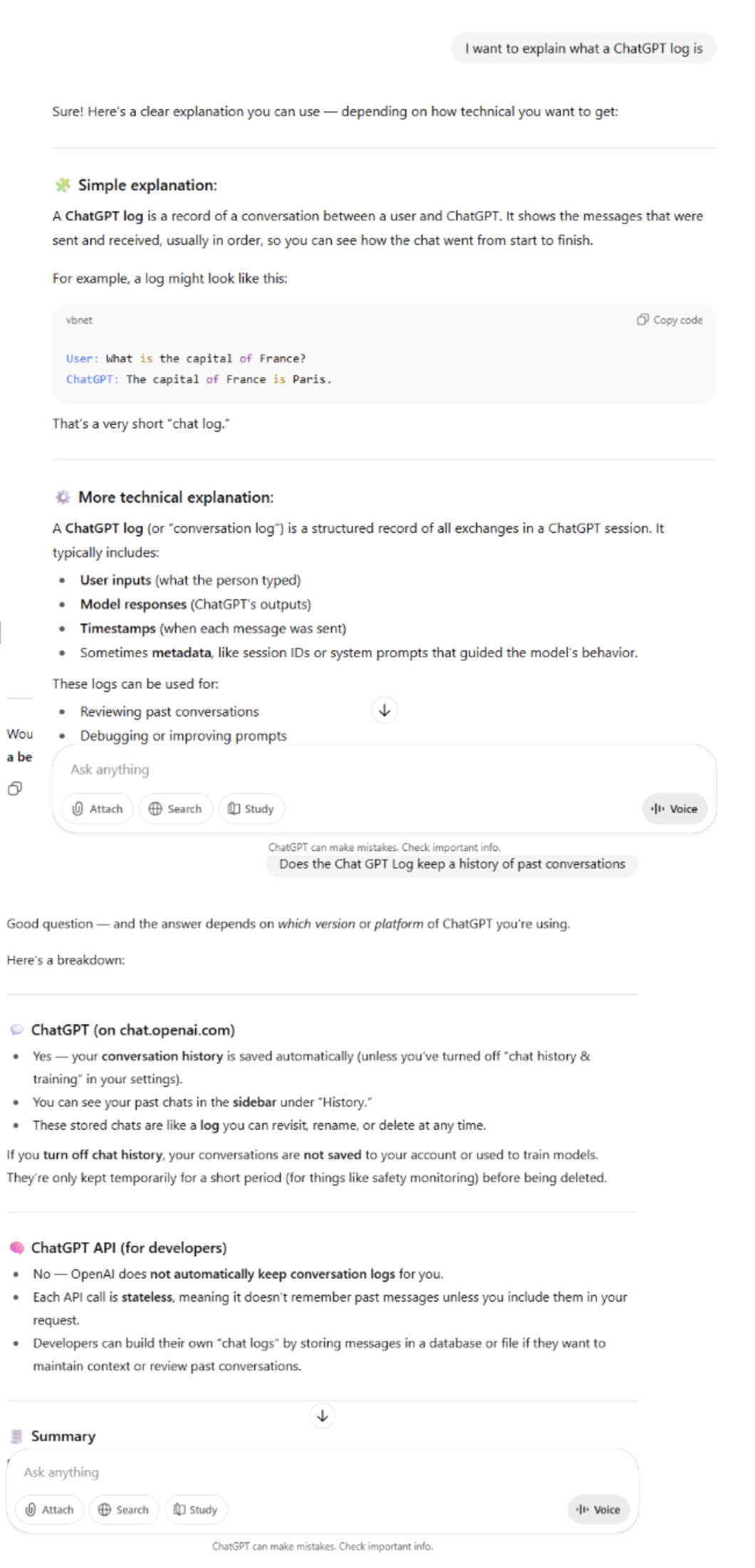
The next question, now that we are treating the chatbot log as a public record—how does the retention schedule apply? The Washington Secretary of State Local Government Common Records Retention Schedule (last updated 2024) includes the following relevant provisions:
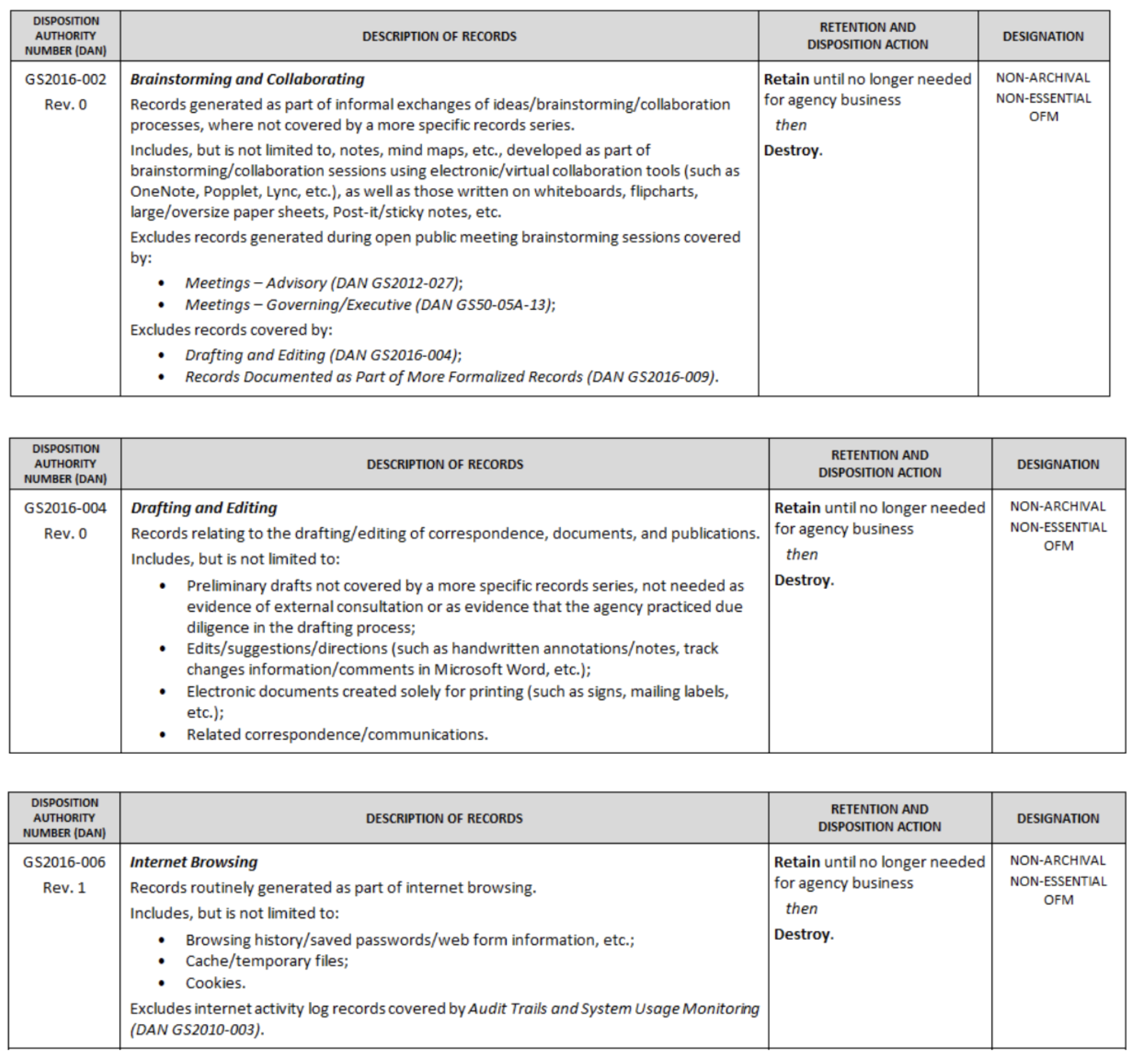
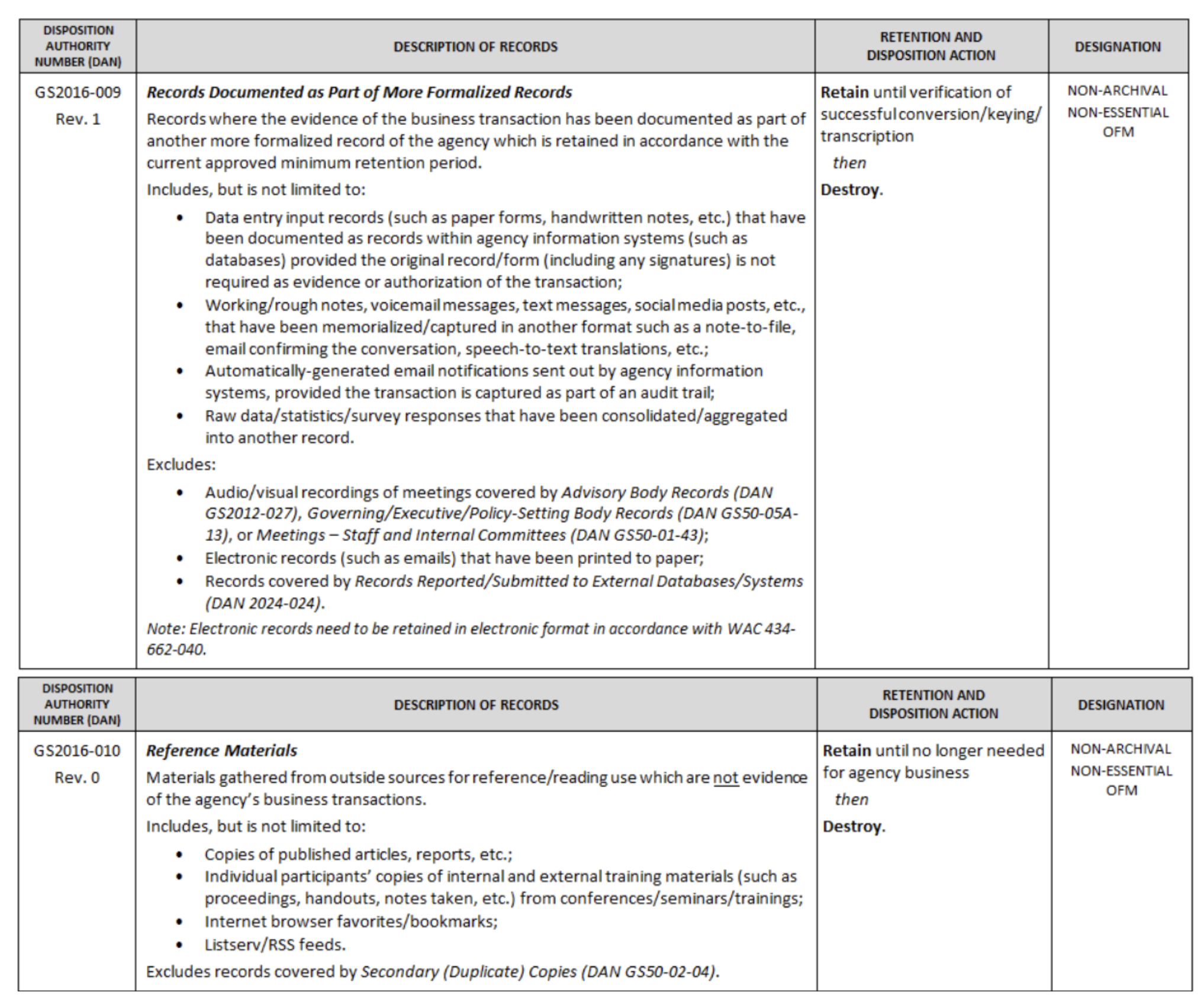
The SOS Record Retention Schedule does not specifically address chatbot logs; however, chatbot logs are similar to some of the other referenced examples of records with minimal retention value, such as “data entry inputs,” “browsing history,” “cache file,” and “brainstorming” records. This means that many, though not necessarily all, chatbot log entries will fall within the category of “transitory records,” referred to by the SOS as records with “minimal retention value.” While the above retention guidelines suggest the majority of chatbot conversations are records with minimum retention value, the applicable retention period may depend on the topic and content of the prompt and/or the product of the chatbot conversation. Public records can, and should, be destroyed as permitted by RCW 40.14, SOS retention schedules, and adopted port policy. But the unlawful destruction of public records can be a crime, 3 result in forfeiture of office, 4 and result in civil penalties available to the requester in the PRA. Accordingly, port personnel should carefully consider the topic or material before inputting it into a chatbot. Not only could the information entered into a chatbot have PRA and records retention implications,but the use of these tools could violate privacy, confidentiality, and municipal ethics laws as well.
If your port retains these chatbot logs and does not destroy them according to an adopted records retention policy, then the logs should be disclosed upon request, unless that material is exempt under the PRA. The determination of whether a PRA exemption applies often depends on the content of the record itself. If a request for a chatbot log is made, you should work with your public records office and legal counsel to determine if any of the listed exemptions in the PRA apply. A general exemption that may apply is in RCW 42.56.280 for deliberative process. However, this exemption does not apply after the port is no longer deliberating and has produced the final document or implemented the policy or recommendation. 5
The conversation and debate about use of generative AI tools by government agencies is only beginning. There certainly are considerations, whether legal, ethical, political or otherwise, that are at play. For example, a current question being posed to government agencies is whether the agencies should have to label any communications that include generative text from a
chatbot such as ChatGPT. Some guidance recommends notifying the public of generative AI use, but there is no law or requirement on this issue…yet.
Most of the people I have spoken to about these issues recognize that generative AI is going to play an increasingly larger role in the workplace, including public agencies. To that end, the debate on whether to use this tool or not may be nearing its end, but this discussion is certainly shifting how to appropriately use these tools in public agencies, including ports.
Recommendations to Consider:
- Review, amend, or adopt a policy at your port for record retention and destruction. 6 The SOS 2024 Record Retention Schedule available online does not specifically address chatbot logs, but some of the provisions for retention of records with minimal retention value may apply. Your port can adopt a policy that specifically addresses public records and records management for chatbot logs and other generative AI records. Remember that even if a record is transitory in nature and subject to destruction, it cannot be destroyed if it has been requested in a public records request.
- In addition to record retention policies, adopt a policy and procedures for the use of generative AI and chatbots. There are considerations for the use of these tools beyond the requirements of the PRA that are appropriate for ports to consider. The state and other municipal governments have developed guidelines and policies that could be a good starting point—See WaTech Interim Guidelines for use of Generative AI.
- If you are a bit of a luddite like me, work with your IT team to learn more about generative AI and chatbots, including whether certain chatbots have the capability to turn off the function that creates history logs or how this information may otherwise be “retained” on the port’s servers or electronic files. Remember, hidden metadata can be subject to disclosure under the PRA. 7 This information can help your port develop internal policies for the appropriate use of these tools and retention of necessary public records.
- If your port retained or retains chatbot logs, work with your public records officer and legal counsel to understand what information is disclosable or exempt under the PRA.
Lastly, I have a follow-up from last month’s column on differential moorage rates. One of the port members raised an important consideration regarding ports that have federally authorized projects. Please see the updated article here.
If you have a question for Knowing the Waters, please e-mail me at tschermetzler@csdlaw.com.
1 RCW 42.56.010(3) (underlines added).
2 RCW 42.56.010(4).
3 RCW 40.16.010-020.
4 RCW 9.92.120.
5 West v. Port of Olympia, 146 Wn. App. 108, 192 P.3d 926 (Once a port executed a lease with a tenant,
documents reflecting policies or recommendations pertaining to that lease no longer fell within the ambit
of the deliberative process exemption from disclosure under the public records act (PRA), even if public
disclosure might adversely impact the port’s ability to get the “best deal” in future negotiations with other
tenants.)
6 Record retention of public records is governed by RCW 40.14 et seq. Any destruction of official public
records shall be pursuant to a schedule approved under RCW 40.14.050.
7 O’Neill v. City of Shoreline, 170 Wn.2d 138, 240 P.3d 1146 (2010).

